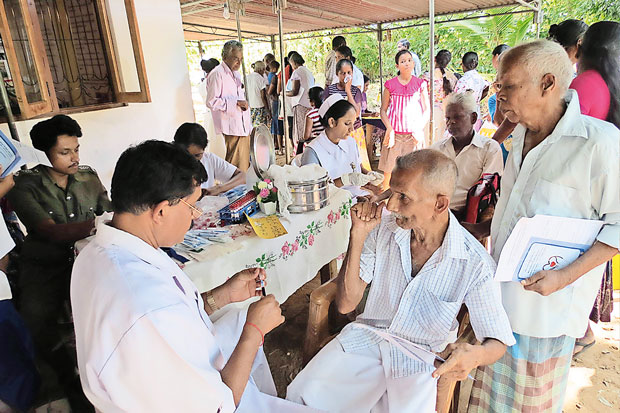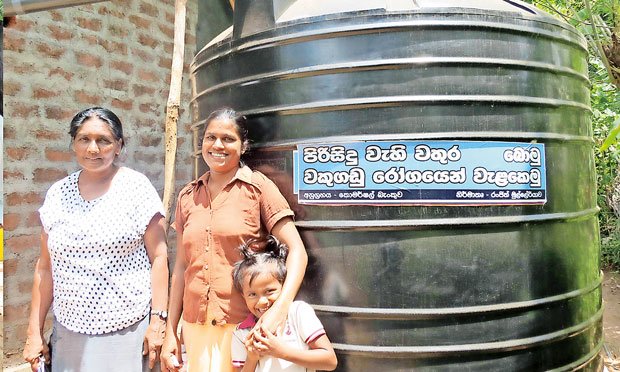18 Aug 2017 - {{hitsCtrl.values.hits}}


Commercial Bank of Ceylon has commenced the second phase of its‘Raindrops’ project to combat Chronic Kidney Disease of an unknown origin (CKDu) following the resounding success of the first phase in whichthe Bank in 2016 donated 5,000 litre storage tanks for rainwater harvesting to 25 families in Ginnoruwa in the Girandurukotte area.
The Raindrops project was initiated in collaboration with the late Ranjith Mulleriyawa, the renowned agronomist who supervised the first phase of this community programme. The management of the entire project is handled by ETC Lanka, a member of the Not-for-Profit organisation ETC International Group based in
Leusden, Netherlands.
During the first phase of the project the familiesthat received storage tanks consumed harvested rainwater for more than one year, after which they were tested for CKDu and the results compared with those of 25 families that consumed well water during that period. An effort was made to ensure that other variables, such as living conditions, food habits and eating patterns of all 50 families remained the same.
Under the second phase of the project, Commercial Bank has commissioned a scientific analysis of the suitability of rainwater for drinking, following indications from the first phase that rainwater is better than groundwater in areas prone to CKDu.
The bank has entrusted the Wayamba University with conducting in-depth research into the water quality, pH value, electrical conductivity and other properties of harvested rainwater to determine the viability of promoting this source of water on a mass scale in areas reporting a high incidence of the dreaded disease.
The initial findings of the study have shown that while several persons from the group that consumed well water havebeen diagnosed with Stage 1 CKDu, none of those that consumed rainwater have shown signs of the disease thus far. “It may be premature to draw scientific conclusions at this stage, but the preliminary findings are certainly encouraging and worth pursuing,” Commercial Bank’s Managing Director/CEO Mr Jegan Durairatnam said. “CKDu is taking far too high a toll of human life in Sri Lanka, and as a responsible corporate citizen Commercial Bank considers it a duty to support the search for an effective and practical solution for the tens of thousands of affected citizens and the many more who are at risk.” Commercial Bank also has commissioned an anthropological study to assess and analyse the changing perceptions of villagers on the consumption of harvested rainwater as an alternative to water from wells.
The study by anthropologist W.A. Upul Kumara Wickramasinghe indicates that persons who consumed rainwater reported the absence of unpleasant tastes, odours, oily film and sediment in the rainwater consumed; an improvement in the taste of food and tea prepared with rainwater and an increase of their individual consumption of water since they made the change to rainwater. Individuals interviewed by the anthropologist had also noted that a burning sensation that was experienced when passing urine after consuming water from wells in the Ginnoruwa area was not evident after consuming rainwater.
It has been estimated that a family of five would need 20 litres of water per day for drinking and cooking purposes, and that a storage structure with the standard eco-friendly features capable of holding 5,000 litres of rainwater would be adequate to last approximately six months to tide over the dry months May to September in areas such as Girandurukotte (Mahaweli System C) which receive an annual rainfall of 1200-1500mm.
The results of the research to be conducted by the Wayamba University in Phase 2 of the ‘Raindrops’ project could lead to more rainwater storage facilities being set up in CKDu-affected areas, the Bank said. Already, the National Water Supply and Drainage Board has come forward to donate 30 more water tanks to families in the Ginnoruwa village.
The success of this project has stimulated the interest of many other organisations to join in promoting the use of rainwater harvesting in the area.
Besides the ‘Raindrops’ project, the Commercial Bank has an extensive, multi-dimensional portfolio of community initiatives that promote IT literacy, online education and English literacy; provide scholarships and laptops to undergraduates; donate essential equipment to hospitals; support the preservation and restoration of sites of historic, cultural or religious significance, fund reforestation of depleted rainforests and support the rehabilitation needs of disabled soldiers.
Sri Lanka’s largest and most profitable private bank and the country’s most-awarded financial institution, Commercial Bank plays a significant role in the national economy.
09 Jan 2025 3 hours ago
09 Jan 2025 5 hours ago
09 Jan 2025 7 hours ago
09 Jan 2025 7 hours ago
09 Jan 2025 8 hours ago